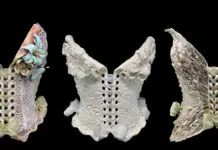Karen Galbraith and her husband, Dave, own the Walnut Creek Alpaca Farm near Talihina in southeastern Oklahoma. Alpacas aren’t just exotic animals native to South America. They’re a labor of love for this former ballet dancer and chiropractor that practically fell into the business of Alpaca farming. And fell in love with Oklahoma along the way.
Oklahoma Magazine: There are dozens of different livestock types you can raise in Oklahoma? Why alpacas?
Karen Galbraith: Well, we first started with paint horses. But then they did away with the slaughter of horses and it got to the point where you couldn’t give one away. People were turning horses out and it just got to be too much. But even before that, we wanted to try something else. We tried goats and didn’t care for it. I happened to see an alpaca commercial one day and we went from there. Got into alpacas and never looked back.
OM: Tell me about getting into it. Nobody just jumps into something like alpaca farming.
KG: We did. I bought my first alpaca before I’d seen one in person. I bought it over the internet.
OM: It showed up and you were just good to go?
KG: Yeah. I wanted to do it. I found a breeder and bought a female. She had a baby girl before she even arrived at our farm. I ended up buying that female and before that female even came home we’d already bought two more females and a male. When we had them all come here at once it was a male with four females.
OM: After you jumped right into it, what was the “Aha!” moment where you said, “This is what I want to do?”
KG: Day one when they got here. I just fell in love with them and knew I wanted to do it. I know it sounds crazy but we bred the females and the girls had their babies. I resold a female with her son along with another female. I sold that package my first year and I was already in the black.
OM: I know alpaca farming isn’t your first career and you’re originally a city girl, definitely not from these parts. What brought you to them?
KG: I was dancing ballet, my first love, but I had to have several eye operations. After the last one, I realized I was getting too far behind in my dance career. So I dropped it and went to school to be a chiropractor. I opened up a practice and got into a car accident. I thought I wouldn’t be able to practice after that but changed my mind and decided I could still do chiropractic enough to help people. Well, I wanted to help Native Americans so I came to Oklahoma. It was great. Eventually, though, I did have to leave chiropractic. But I wanted to stay in this area. There wasn’t much work here so I had to take a lot of different kinds of jobs. Then I met my husband, Dave, and we moved onto the ranch after we were married. We were together for a short time before we decided to start alpaca farming.
OM: Where is alpaca wool used? Is it common? Can I find it at the mall?
KG: More and more you’re starting to find alpaca wool everywhere. It used to be very rare. Now you can go to a yarn shop and find alpaca yarn. The alpaca wool itself is so much warmer than sheep wool and it’s also softer and stronger. It’s just a much better wool. Alpaca wool has just taken off. I’ve even seen a wedding dress made out of alpaca wool.
OM: What pays the bills? Selling the alpacas or selling their wool?
KG: Right now I make most of my money from the breeders. We raise show quality alpacas and every year we try to breed up. We’ve improved our breeding stock and we sell the breeders. But we also sell the wool to handspinners or have it spun up by a mill. In the end, the wool will bring in the money. But right now it’s still a breeder’s market.
OM: Alpacas are livestock, for sure, but how is raising them different from, say, raising horses or cattle?
KG: Horses are bigger. They’re harder to sell. I can make more money with alpacas and they’re smaller and easier for me to handle. And they’re sweet. They’re just sweet, timid animals. When you’re around them, you start to realize how peaceful and friendly alpacas are. I can take a new male or female and put them in with the herd and it’s not like horses. Horses will tear each other up. But I can introduce a new alpaca to the pen and I don’t have to worry about it getting injured.
OM: How much will a solid alpaca put me out?
KG: It depends on the quality you want, from beginner’s level on up to show quality. Ours start at about $700 and go up from there.
OM: You sound like a person who loves what they do. I guess the alpacas won’t send you packing back to the city?
KG: I love it here. I’ll never move back to the city, I swear.

























